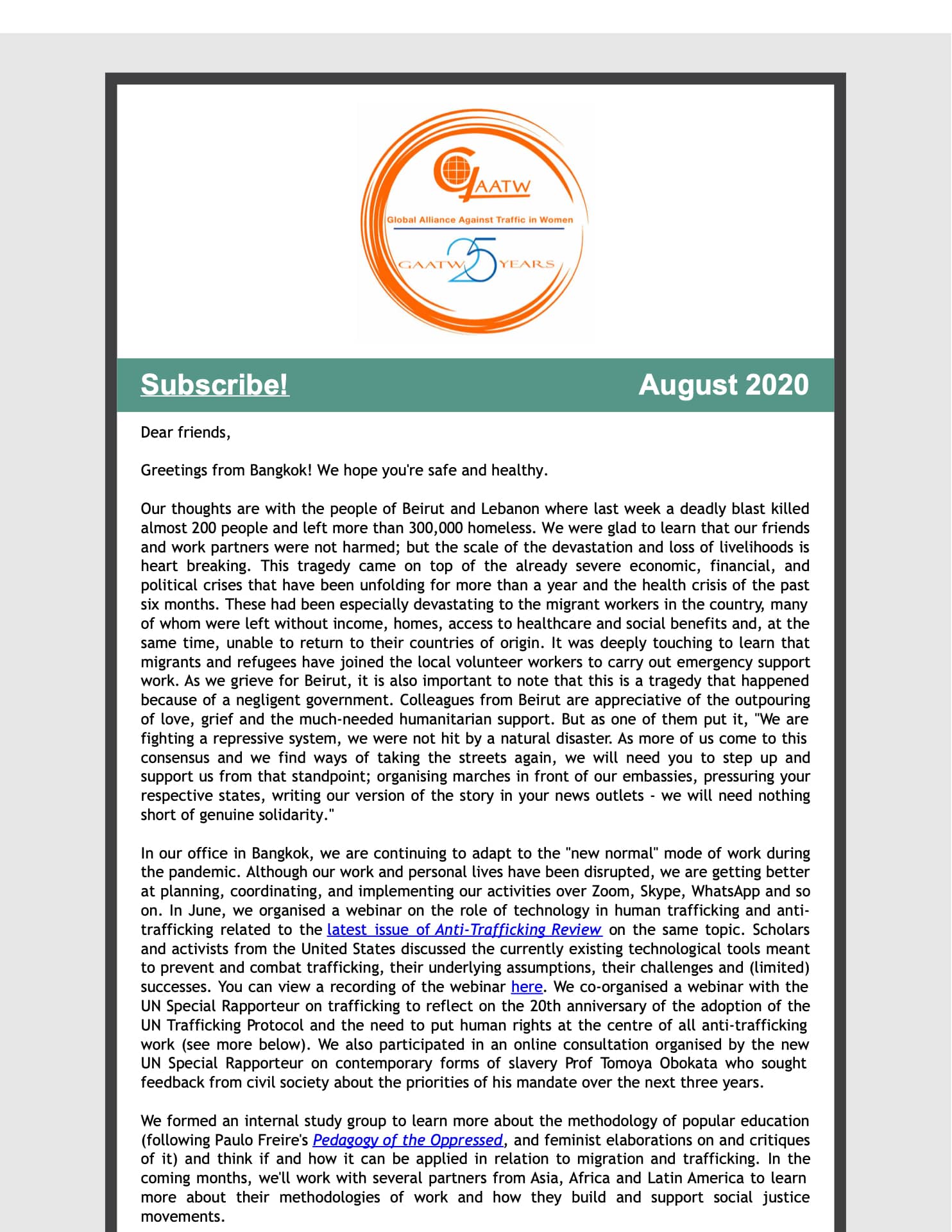
GAATW E-bulletin: Issue 3, August 2020
- Category: E-Bulletin
Dear friends,
Greetings from Bangkok! We hope you're safe and healthy.
Our thoughts are with the people of Beirut and Lebanon where last week a deadly blast killed almost 200 people and left more than 300,000 homeless. We were glad to learn that our friends and work partners were not harmed; but the scale of the devastation and loss of livelihoods is heart breaking. This tragedy came on top of the already severe economic, financial, and political crises that have been unfolding for more than a year and the health crisis of the past six months. These had been especially devastating to the migrant workers in the country , many of whom were left without income, homes, access to healthcare and social benefits and, at the same time, unable to return to their countries of origin. It was deeply touching to learn that migrants and refugees have joined the local volunteer workers to carry out emergency support work. As we grieve for Beirut, it is also important to note that this is a tragedy that happened because of a negligent government. Colleagues from Beirut are appreciative of the outpouring of love, grief and the much-needed humanitarian support. But as one of them put it, "We are fighting a repressive system, we were not hit by a natural disaster . As more of us come to this consensus and we find ways of taking the streets again, we will need you to step up and support us from that standpoint; organising marches in front of our embassies, pressuring your respective states, writing our version of the story in your news outlets - we will need nothing short of genuine solidarity."
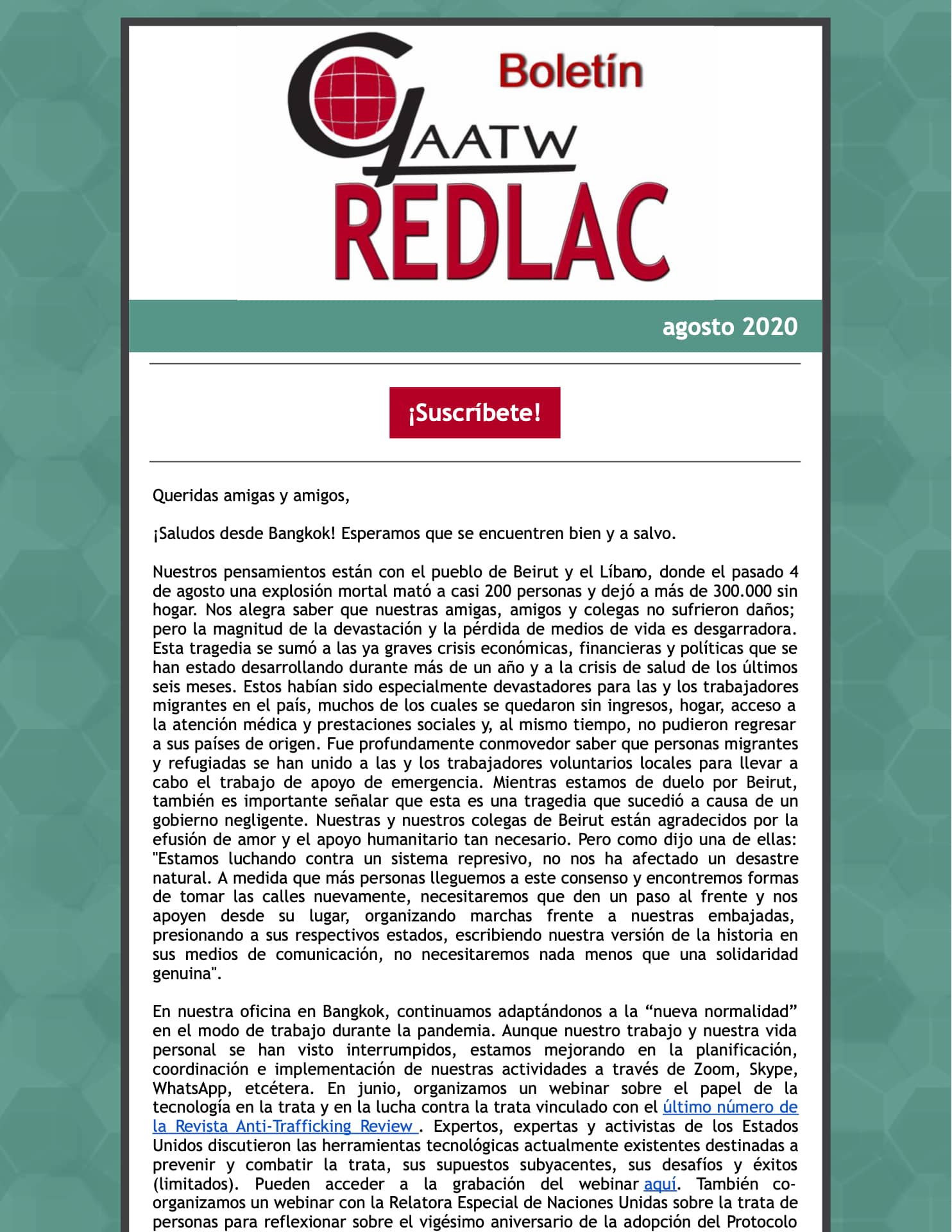
Boletín en español, Agosto 2020
- Category: E-Bulletin
Queridas amigas y amigos,
¡Saludos desde Bangkok! Esperamos que se encuentren bien y a salvo.
Nuestros pensamientos están con el pueblo de Beirut y el Líbano, donde el pasado 4 de agosto una explosión mortal mató a casi 200 personas y dejó a más de 300.000 sin hogar. Nos alegra saber que nuestras amigas, amigos y colegas no sufrieron daños; pero la magnitud de la devastación y la pérdida de medios de vida es desgarradora. Esta tragedia se sumó a las ya graves crisis económicas, financieras y políticas que se han estado desarrollando durante más de un año y a la crisis de salud de los últimos seis meses. Estos habían sido especialmente devastadores para las y los trabajadores migrantes en el país, muchos de los cuales se quedaron sin ingresos, hogar, acceso a la atención médica y prestaciones sociales y, al mismo tiempo, no pudieron regresar a sus países de origen. Fue profundamente conmovedor saber que personas migrantes y refugiadas se han unido a las y los trabajadores voluntarios locales para llevar a cabo el trabajo de apoyo de emergencia. Mientras estamos de duelo por Beirut, también es importante señalar que esta es una tragedia que sucedió a causa de un gobierno negligente. Nuestras y nuestros colegas de Beirut están agradecidos por la efusión de amor y el apoyo humanitario tan necesario. Pero como dijo una de ellas: "Estamos luchando contra un sistema represivo, no nos ha afectado un desastre natural.
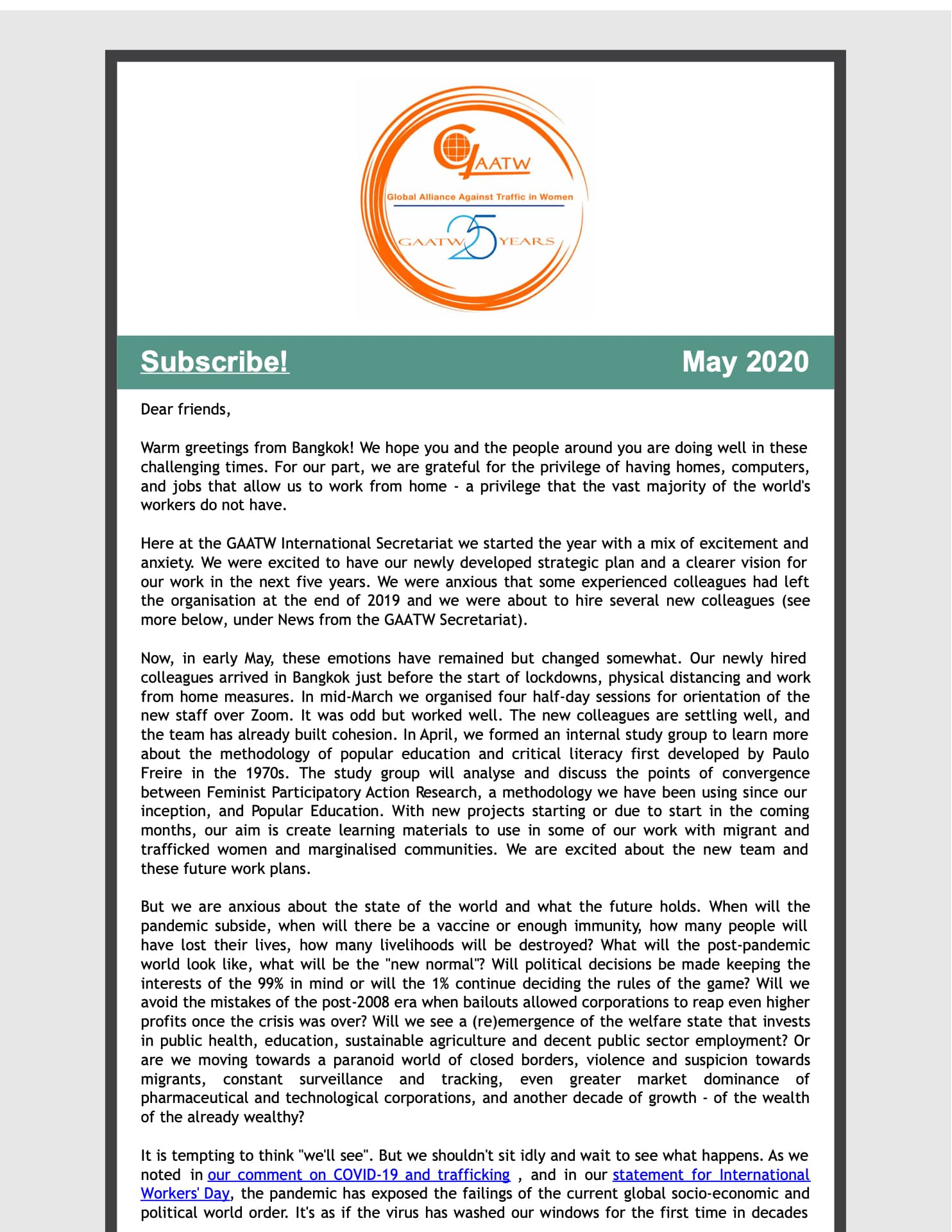
GAATW E-bulletin: Issue 2, May 2020
- Category: E-Bulletin
Dear friends,
Warm greetings from Bangkok! We hope you and the people around you are doing well in these challenging times. For our part, we are grateful for the privilege of having homes, computers, and jobs that allow us to work from home - a privilege that the vast majority of the world's workers do not have.
Here at the GAATW International Secretariat we started the year with a mix of excitement and anxiety . We were excited to have our newly developed strategic plan and a clearer vision for our work in the next five years. We were anxious that some experienced colleagues had left the organisation at the end of 2019 and we were about to hire several new colleagues (see more below, under News from the GAATW Secretariat).
Now, in early May , these emotions have remained but changed somewhat. Our newly hired colleagues arrived in Bangkok just before the start of lockdowns, physical distancing and work from home measures. In mid-March we organised four half-day sessions for orientation of the new staff over Zoom. It was odd but worked well. The new colleagues are settling well, and the team has already built cohesion. In April, we formed an internal study group to learn more about the methodology of popular education and critical literacy first developed by Paulo Freire in the 1970s. The study group will analyse and discuss the points of convergence between Feminist Participatory Action Research, a methodology we have been using since our inception, and Popular Education. With new projects starting or due to start in the coming months, our aim is create learning materials to use in some of our work with migrant and trafficked women and marginalised communities. We are excited about the new team and these future work plans.

Boletín en español, Mayo 2020
- Category: E-Bulletin
Queridas amigas y amigos,
¡Saludos desde Bangkok!
Esperamos que ustedes y las personas que los rodean se encuentren bien en estos tiempos difíciles. Por nuestra parte, estamos agradecidas por el privilegio de tener hogares, computadoras y trabajos que nos permiten trabajar desde casa - un privilegio que la gran mayoría de las y los trabajadores del mundo no tiene.
Aquí en el Secretariado Internacional de GAATW comenzamos el año con una mezcla de emoción y ansiedad. Nos entusiasmó tener nuestro plan estratégico recién desarrollado y una visión más clara de nuestro trabajo en los próximos cinco años. Estábamos ansiosas porque algunas de nuestras colegas con mayor experiencia dejaron la organización a fines de 2019 y estábamos a punto de contratar a varias colegas nuevas (ver más en Noticias del Secretariado Internacional de GAATW).
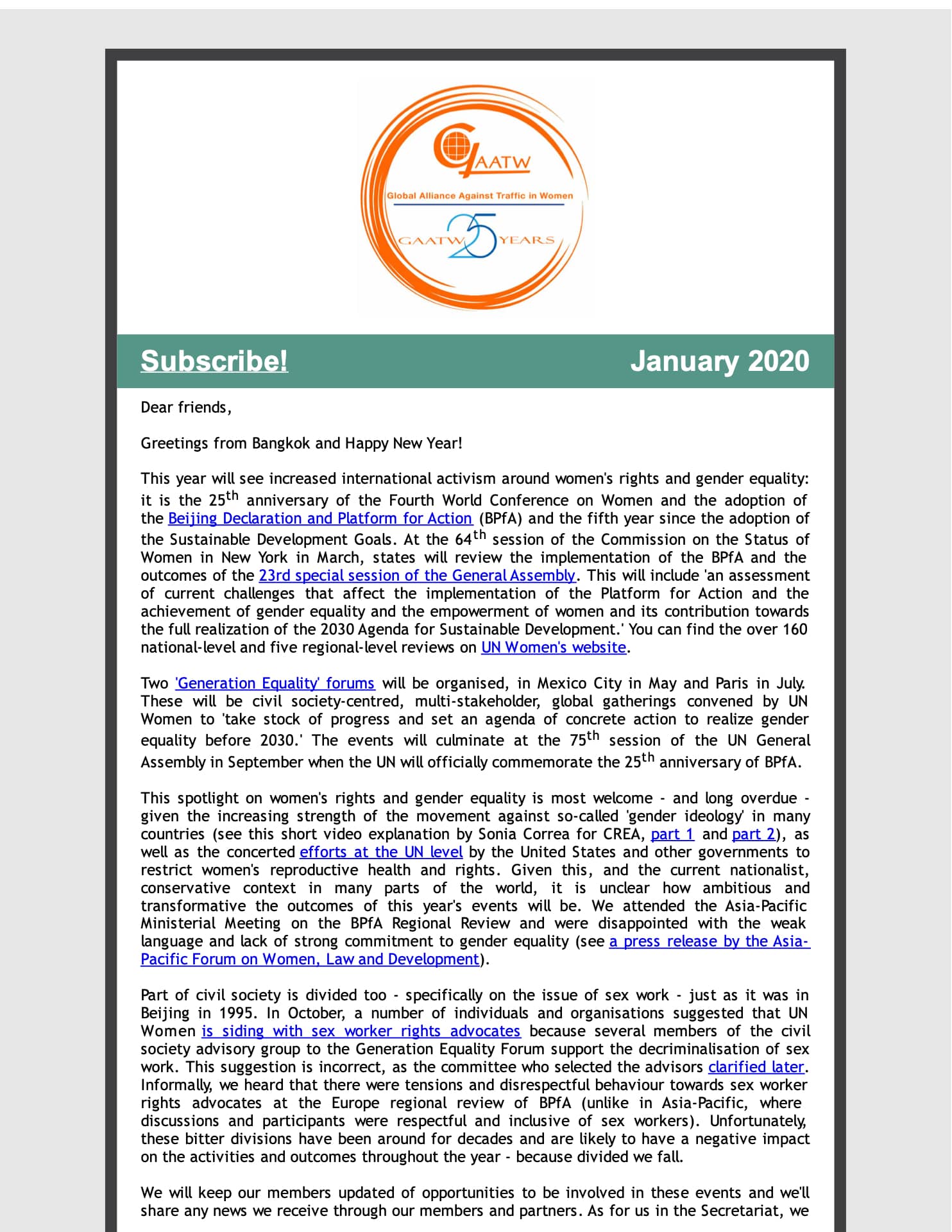
GAATW E-bulletin: Issue 1, January 2020
- Category: E-Bulletin
Dear friends,
Greetings from Bangkok and Happy New Year!
This year will see increased international activism around women's rights and gender equality: it is the 25th anniversary of the Fourth World Conference on Women and the adoption of the Beijing Declaration and Platform for Action (BPfA) and the fifth year since the adoption of the Sustainable Development Goals. At the 64th session of the Commission on the Status of Women in New York in March, states will review the implementation of the BPfA and the outcomes of the 23rd special session of the General Assembly. This will include 'an assessment of current challenges that affect the implementation of the Platform for Action and the achievement of gender equality and the empowerment of women and its contribution towards the full realization of the 2030 Agenda for Sustainable Development. ' You can find the over 160 national-level and five regional-level reviews on UN Women's website.
Two 'Generation Equality ' forums will be organised, in Mexico City in May and Paris in July . These will be civil society-centred, multi-stakeholder , global gatherings convened by UN Women to 'take stock of progress and set an agenda of concrete action to realize gender equality before 2030. ' The events will culminate at the 75th session of the UN General Assembly in September when the UN will officially commemorate the 25th anniversary of BPfA.
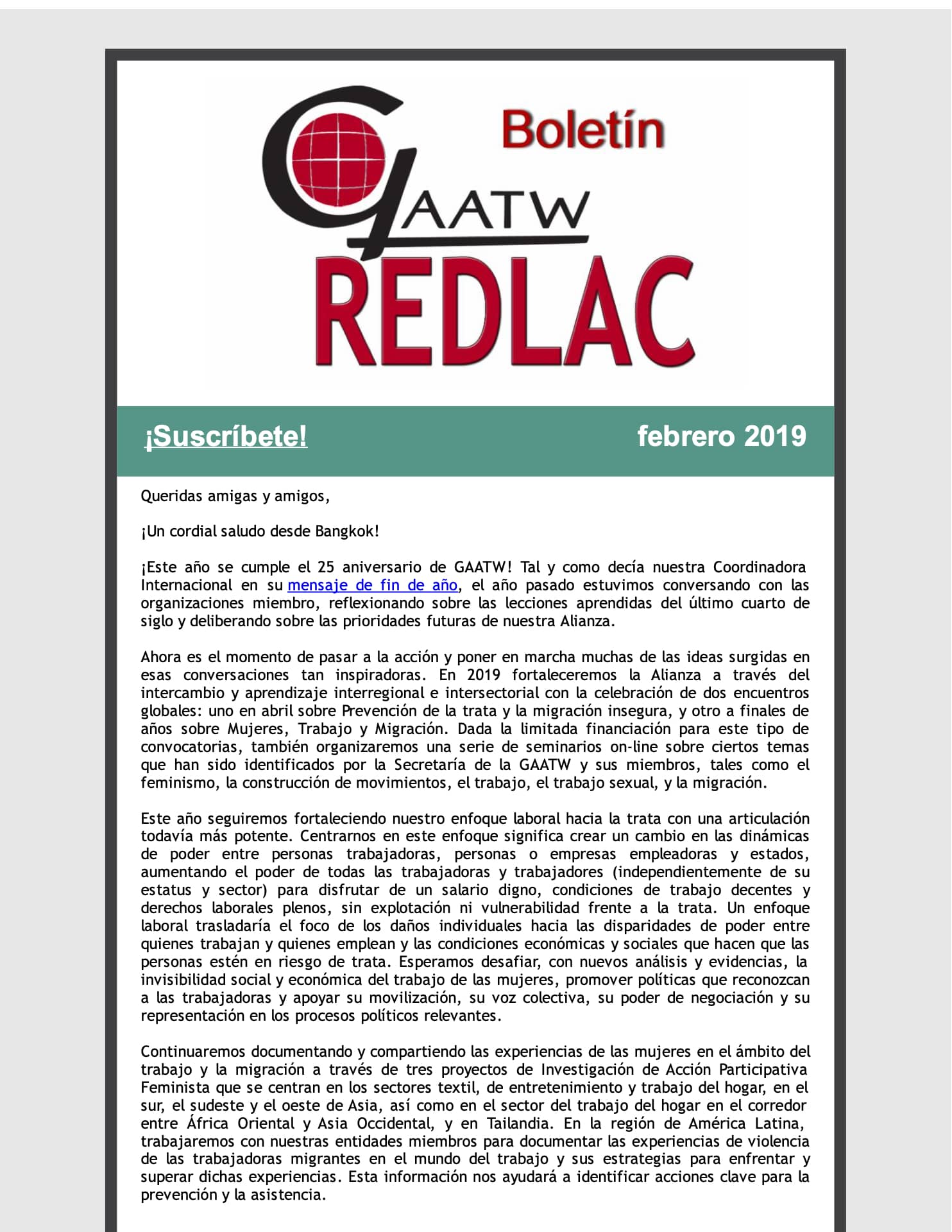
Boletín en español, 2019
- Category: E-Bulletin
Queridas amigas y amigos,
¡Un cordial saludo desde Bangkok!
¡Este año se cumple el 25 aniversario de GAATW! Tal y como decía nuestra Coordinadora Internacional en su mensaje de fin de año, el año pasado estuvimos conversando con las organizaciones miembro, reflexionando sobre las lecciones aprendidas del último cuarto de siglo y deliberando sobre las prioridades futuras de nuestra Alianza.
Ahora es el momento de pasar a la acción y poner en marcha muchas de las ideas surgidas en esas conversaciones tan inspiradoras. En 2019 fortaleceremos la Alianza a través del intercambio y aprendizaje interregional e intersectorial con la celebración de dos encuentros globales: uno en abril sobre Prevención de la trata y la migración insegura, y otro a finales de años sobre Mujeres, Trabajo y Migración. Dada la limitada financiación para este tipo de convocatorias, también organizaremos una serie de seminarios on-line sobre ciertos temas que han sido identificados por la Secretaría de la GAATW y sus miembros, tales como el feminismo, la construcción de movimientos, el trabajo, el trabajo sexual, y la migración.
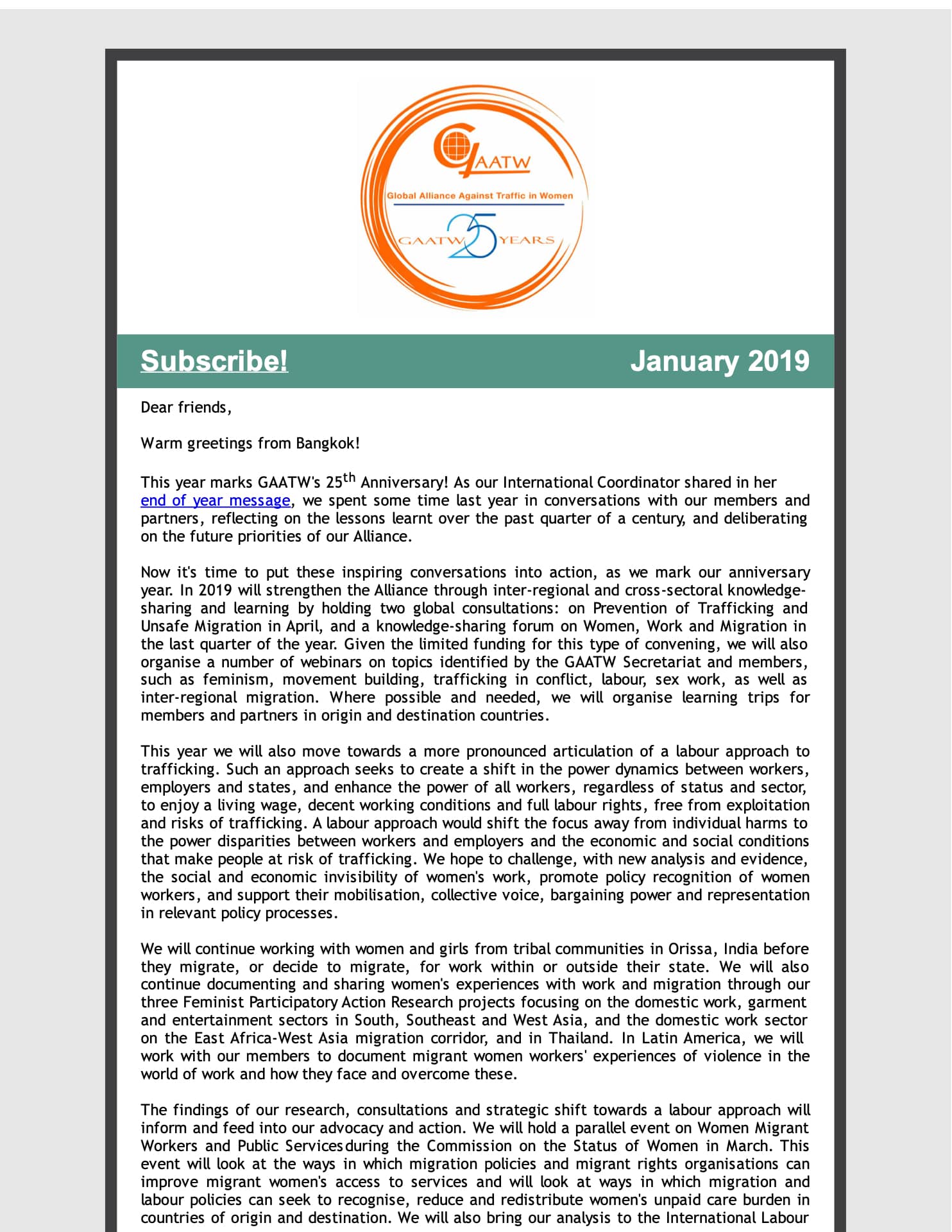
GAATW E-bulletin 2019
- Category: E-Bulletin
Dear friends,
Warm greetings from Bangkok!
This year marks GAATW's 25th Anniversary! As our International Coordinator shared in her end of year message, we spent some time last year in conversations with our members and partners, reflecting on the lessons learnt over the past quarter of a century , and deliberating on the future priorities of our Alliance.
Now it's time to put these inspiring conversations into action, as we mark our anniversary year . In 2019 will strengthen the Alliance through inter-regional and cross-sectoral knowledge- sharing and learning by holding two global consultations: on Prevention of Trafficking and Unsafe Migration in April, and a knowledge-sharing forum on Women, Work and Migration in the last quarter of the year . Given the limited funding for this type of convening, we will also organise a number of webinars on topics identified by the GAATW Secretariat and members, such as feminism, movement building, trafficking in conflict, labour , sex work, as well as inter-regional migration. Where possible and needed, we will organise learning trips for members and partners in origin and destination countries.
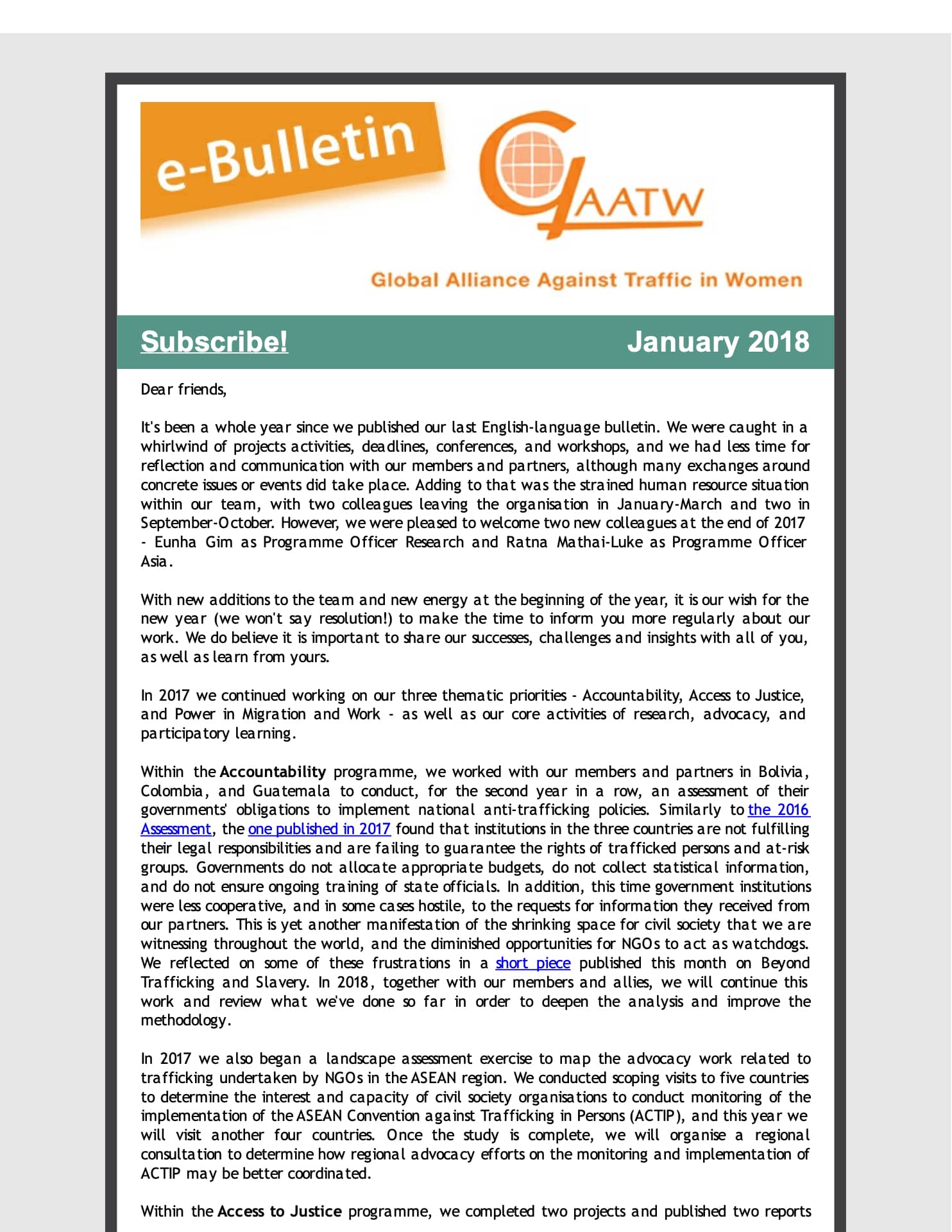
GAATW E-bulletin 2018
- Category: E-Bulletin
Dear friends,
It's been a whole year since we published our last English-language bulletin. We were caught in a whirlwind of projects activities, deadlines, conferences, and workshops, and we had less time for reflection and communication with our members and partners, although many exchanges around concrete issues or events did take place. Adding to that was the strained human resource situation within our team, with two colleagues leaving the organisation in January-March and two in September-October . However , we were pleased to welcome two new colleagues at the end of 2017 - Eunha Gim as Programme Officer Research and Ratna Mathai-Luke as Programme Officer Asia.
With new additions to the team and new energy at the beginning of the year , it is our wish for the new year (we won't say resolution!) to make the time to inform you more regularly about our work. We do believe it is important to share our successes, challenges and insights with all of you, as well as learn from yours.
In 2017 we continued working on our three thematic priorities - Accountability, Access to Justice, and Power in Migration and Work - as well as our core activities of research, advocacy, and participatory learning.
